|
The Acton model is cutting-edge for the 21st century yet incorporates tried and true methodologies from many different disciplines. You’ll see inspiration from the Montessori method, the Socratic model, project-based learning, the Democratic Schools model, and apprenticeship models. All blend together seamlessly to create the learning experience our children deserve. Acton graduates have gone on to get into the colleges and universities of their choice, from Ivy League schools to military academies. Acton graduates have gone on to launch their businesses and non-profits. Whatever they’re doing their Acton experience gave them the tools needed to find a calling and change their world. Want to learn more? Check out this web page for more about the various Acton inspirations, or watch this video with Acton founder Laura Sandefer about the origins of the Acton schools and how the model works. Do you have questions, or are you ready to schedule a tour? Click here to schedule a discovery call today!
0 Comments
We’re not a school where you drop your children off and hope for the best. We ask that parents be the “guardrails” along with the guides. How do you do that? Three things are crucial for Acton families:
Age-appropriate independence and responsibility at an early age have long been lauded as the biggest predictor of success. That holds true for learners in the Acton model. The learners who thrive in a learner-driven environment are the ones whose home environment closely resembles the Acton model with independence and responsibility at home. Parents of children in traditional schools have told us they often feel disconnected from their child’s learning and school experience. At Acton Marietta, we ask our parents to have regular family meetings to discuss what their children have been doing at school. Families who place value on the child’s important work at school will see their learners thrive in a model like Acton. Family meetings are a chance for families to show their children that they have important work to do and give the children a chance to celebrate their successes with their families. We also ask that families attend our public Exhibitions. Acton’s Exhibitions of Learning take place at the end of four- to seven-week sprints that make up a session. Much like an agile software sprint, sessions have a real-world deliverable at the end and are presented to a live studio audience made up of more than parents. Exhibitions are performances with stakes as high as possible. We want Heroes to feel more like Steve Jobs presenting the iPhone than like a lame middle school science fair. Want to learn more? Check out this article on being an Acton parent, or watch the video below to hear how various Acton parents and founders view Acton. Want to take a deep dive? Watch this video with Acton founder Laura Sandefer about the origins of the Acton schools and how the model works. Do you have questions, or are you ready to schedule a tour? Click here to schedule a discovery call today! Maria Montessori believed deeply in the prepared environment - that if the adults set up the learning environment with care (challenging but meaningful work), learners would be empowered to learn anything and everything offered. A typical day at Acton is broken down into two main parts, with the morning being focused time on self-paced work in math, language arts, writing, reading, and target language (older learners). The afternoon is focused on collaborative, hands-on work with a real-world connection and application to science and the humanities. Here are the typical schedules for Acton learners: The Explorer Studio (ages 5-8) 8:20 Morning Circle and Mindfulness 9:00 Montessori-based Work Cycle 9:45 Outdoor Break 10:00 Montessori-based Work Cycle 11:15 Project Time 12:15 Celebration Circle 12:30 Lunch 1:00 Outdoor Play 3:00 Studio Maintenance 3:15 Closing Circle 3:25 Dismissal The Adventurer Studio (ages 8-11) 8:20 Mindfulness and Morning Launch 8:45 Core Skills 10:00 Outdoor Break 10:15 Core Skills 11:15 Lunch/Outdoor Free Time 12:15 DEAR/Read Aloud 12:45 Project Time (Science/History/Electives) 3:00 Studio Maintenance 3:15 Closing Circle 3:25 Dismissal The Navigator Studio (ages 11-14) & The Pathfinder Studio (ages 14-18) 8:20 Mindfulness and Morning Launch 8:45 Core Skills 10:15 Outdoor Break 10:30 Core Skills 11:15 Mid-morning Launch/Collab Time 12:15 Lunch/Outdoor Free Time 1:00 Socratic Discussion 1:20 Project-based Learning (Science/History/Electives) 3:00 Studio Maintenance 3:15 Closing Discussion 3:25 Dismissal Want to learn more? Check out this article on the Acton High School experience, or check out Seth Godin’s video about Acton schools. Want to take a deep dive? Watch this video with Acton founder Laura Sandefer about the origins of the Acton schools and how the model works. Do you have questions, or are you ready to schedule a tour? Click here to schedule a discovery call today! Many parents have noticed that the rigor of school content gets heavier at younger and younger ages every year. Will kindergarteners be doing calculus one day? Probably not but learning has changed drastically over the years in order to prepare for more tests. These changes have come at the expense of social and emotional learning, personal development, and outdoor play. Acton Marietta has set out to reimagine school by more thoughtfully preparing the learning environment. Acton learners are grouped by age rather than grade level into what we call “studios.” Moving from one studio to the next is determined by a number of readiness factors of the individual rather than the calendar or other arbitrary markers. Here’s a brief overview of the goals and emphasis of each studio. Want to learn more? To take a deeper dive into each studio, check our Learning Design page on our website and scroll down to the studio descriptions. Check out the video below for a Day in the Life in a typical Acton studio. Want to take a deep dive? Watch this video with Acton founder Laura Sandefer about the origins of the Acton schools and how the model works. Do you have questions, or are you ready to schedule a tour? Click here to schedule a discovery call today! The simple answer is adults get out of the way… We shared briefly in a previous email what it looks like for young people when learning gets turned upside down. But where are the adults in a learner-driven school? Won’t it be like Lord of the Flies? We get this question a lot. Imagine guardrails on either side of a highway…guides and parents act as guardrails for their learners. We give them the freedom to “drive” their learning, making choices, growing confidently in their independence, and occasionally failing but learning to get back up and to keep going. Guides protect learners from “running off the road” completely and derailing their school experience by setting schedules, leading thoughtful discussions, gamifying learning, and watching out for safety concerns. Guides create badge plans to ensure learners meet all national standards and explore the same educational content as peers in other schools but prepare the learning environment to be engaging and learner-driven rather than teacher-centric. Guides are Socratic, meaning they never answer a question directly but respond with questions or choices that support learners in discovering the answers for themselves. Guides serve as allies and helpers but are never the star of the show. So, no, it’s not like Lord of the Flies. Empowered learners are engaged and excited to learn. When given the power to self-govern, they operate in a mini-civil society with rules, structure, consequences, and meaningful rewards. When adults hold guardrails to protect and guide rather than to control and coerce, learners grow into confident, creative, and autonomous young people. Want to learn more? Check out this article on Socratic guiding, or watch the video below to learn more. Want to take a deep dive? Watch this video with Acton founder Laura Sandefer about the origins of the Acton schools and how the model works. Do you have questions, or are you ready to schedule a tour? Click here to schedule a discovery call today! We’ve heard for years that teachers are overworked, underpaid, exhausted, and often unsupported. Many parents feel their children are falling through the cracks because of the demands on teachers and lack of funding. Solutions have been attempted for many years with little change. What if children were their own teachers? What would that be like? Acton schools have, in a sense, turned learning upside down - putting young people in the driver’s seat of their education. In a traditional classroom, teachers are the apex of the learning process by planning what, how, when, and where learning will happen. They organize the day and define goals and plans for their students. In the Acton model, learners make work plans for themselves, setting goals and tracking their progress. They decide where to work (not at desks!) and how best to achieve their goals. They seek out solutions to difficult problems. They collaborate peer to peer and teach each other when someone struggles. Young people are at the center of the learning process and are empowered to make choices about their own learning. Freedom is empowering! Young people in learner-driven schools thrive on the independence and autonomy provided when adults are supportive mentors who believe in their inherent worth and genius. Stay tuned to find out what the role of a Guide is in the Acton learning model! Want to learn more? Check out this article on learning in community from peers, or watch the video below to learn more about self-directed learning. Want to take a deep dive? Watch this video with Acton founder Laura Sandefer about the origins of the Acton schools and how the model works. Do you have questions, or are you ready to schedule a tour? Click here to schedule a discovery call today! Parents often worry about their children being stressed over grades in traditional school. The idea of no homework, no tests, and no report cards can sound like a relief at first, but when exploring learner-driven schools like Acton Marietta, parents often wonder, “How will I know if my child is learning without a report card and tests?”. Acton schools offer a wealth of ways to assess learning; they simply look different from traditional tests and grades.
Acton’s Exhibitions of Learning take place at the end of four- to seven-week sprints that make up a session. Much like an agile software sprint, sessions have a real-world deliverable at the end and are presented to a live studio audience made up of more than parents. Exhibitions are performances with stakes as high as possible and we encourage parents and guests to attend and give real-time feedback to the learners. Additionally, learners receive 360 feedback from their peers weekly that reflects their character development and contributions to the studio. Learners meet with guides one-on-one regularly to discuss progress, troubleshoot issues with learning content, or problem-solve dynamics with other learners. Notes from these meetings are accessible to parents, and we encourage parents to discuss these with their learners. The reality is that learner-driven models are more efficient and meaningful than traditional models. Acton learners master more content in less time than their peers and have dramatically more personal satisfaction with their learning and school experience. Want to learn more? Check out this article on how the “old” is new again with the return of the one-room schoolhouse model that Acton employs. Watch the video below to learn more about why mastery is so important. Want to take a deep dive? Watch this video with Acton founder Laura Sandefer about the origins of the Acton schools and how the model works. Do you have questions, or are you ready to schedule a tour? Click here to schedule a discovery call today! Data has recently suggested that as many as 40% of business leaders believe that college graduates are grossly unprepared for the “real world” and being an adult in the workforce. Many schools spend precious learning time preparing for test after test, practicing rote memorization, and operating the same way schools did in the 19th century. Let’s do better. 21st-century learning must include opportunities to build the durable skills so many employers are clamoring for in their employees. Acton Marietta is school reimagined with adaptive game-based programs for foundational core skills. These well-vetted, standards-based programs offer learners the chance to learn at their own pace. Socratic discussions happen 2-3 times every day and give learners a powerful opportunity to strengthen critical thinking skills as they practice speaking in a group, verbalizing their ideas with clarity and conciseness, as well as listening to opposing opinions with respect. Hands-on, real-world projects allow learners to dig into the big ideas in science and the humanities, applying them to life through the chemistry of cooking, simulations of history, or imagining what their life at 25 will be like to understand personal finance better. Finally, life-changing apprenticeships and internships beginning in middle school give young people a powerful opportunity to explore many different industries, career paths, and skills before they enter college. In a nutshell, it’s all the things we, as parents wished we could have had! Want to learn more? Check out this article on how the Acton model encourages entrepreneurship from a young age, or watch the video below to learn more about what school should be. Want to take a deep dive? Watch this video with Acton founder Laura Sandefer about the origins of the Acton schools and how the model works. Do you have questions, or are you ready to schedule a tour? Click here to schedule a discovery call today! |

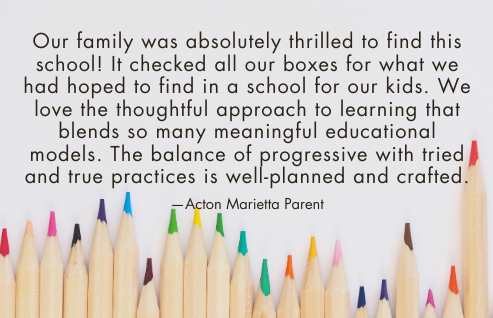
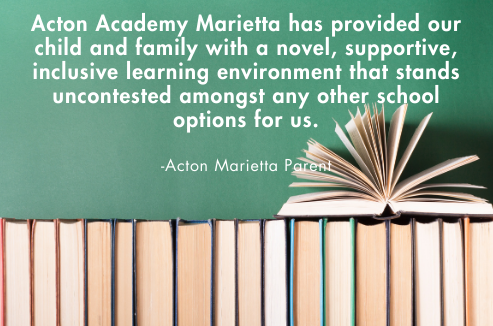
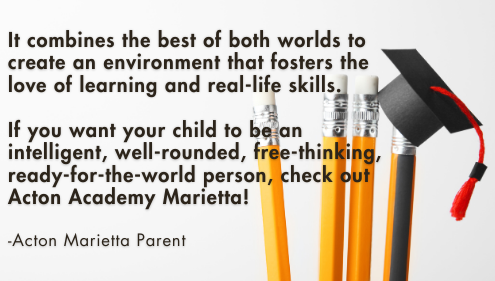
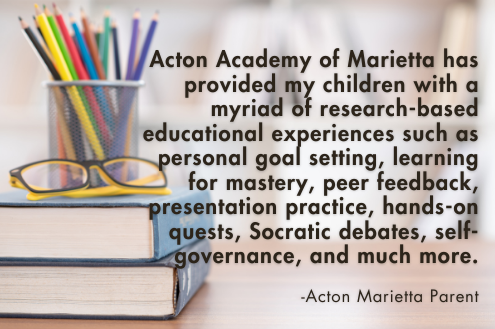
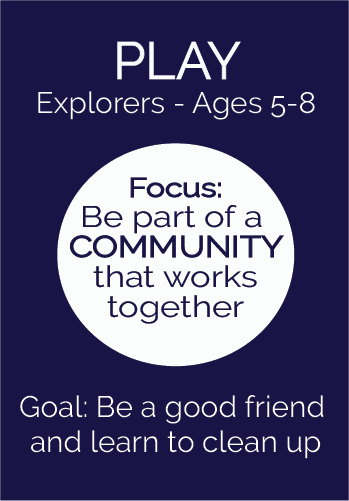
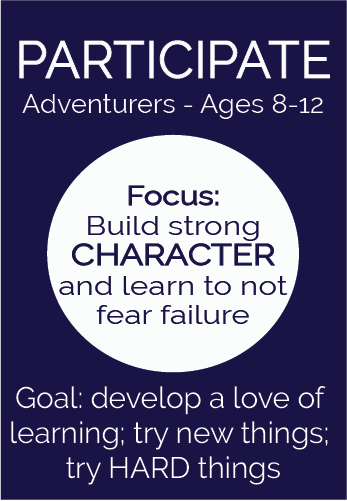
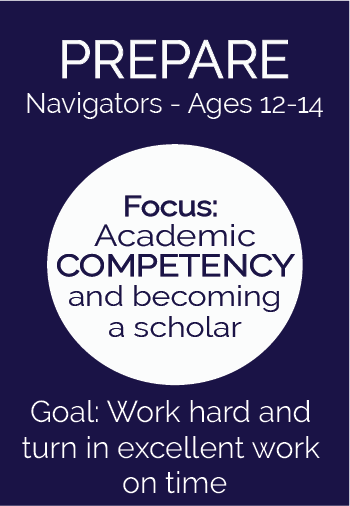
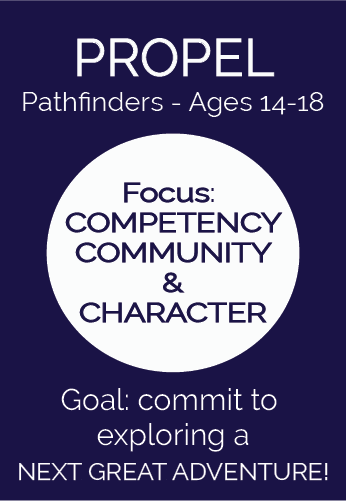
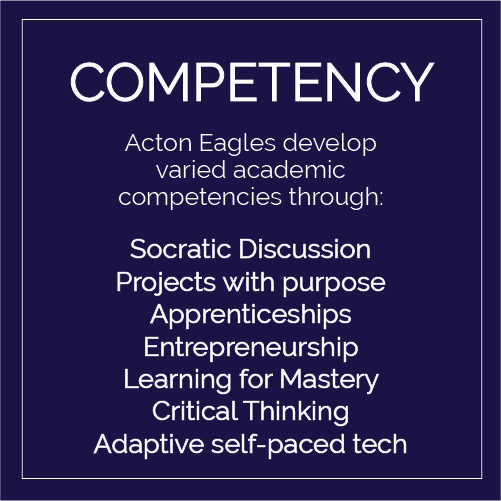
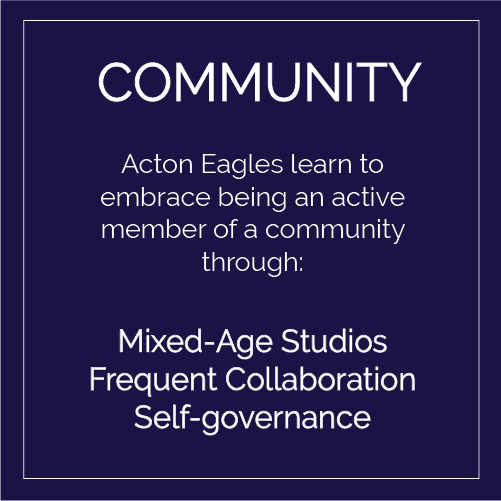
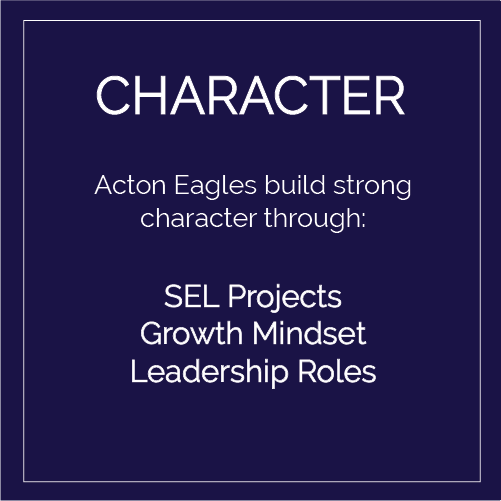
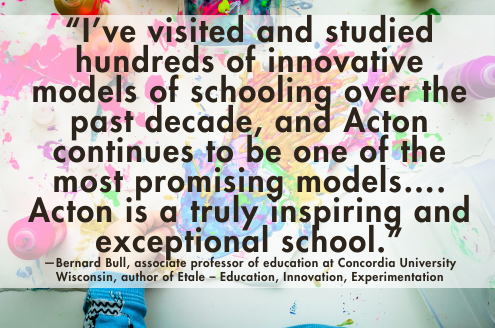
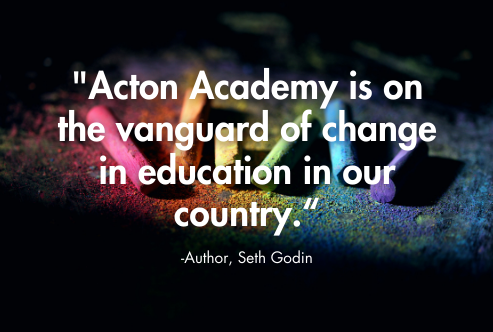
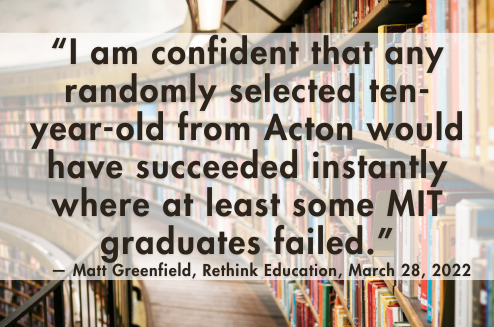
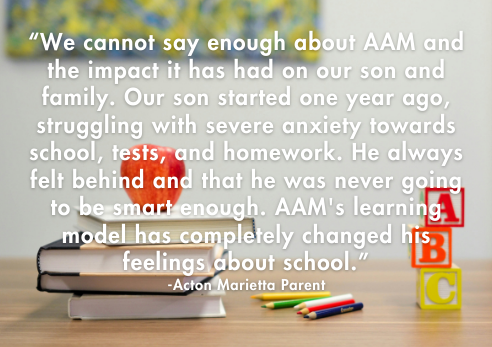
 RSS Feed
RSS Feed